Live from Eurovision: Six months of preparation for the Greatest Show on Earth
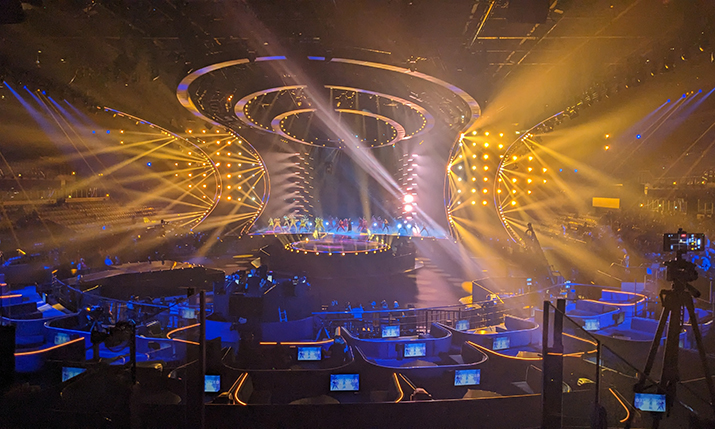
Eurovision: The greatest show on Earth
When the elements align, as they did so powerfully last May, it’s easy to see why the Eurovision Song Contest (ESC) can justifiably be called the greatest show on Earth.
Last year’s winners – Ukraine’s Kalush Orchestra – delivered a hymn to love and longing and the cherished memories of happier times, broadcast live from Turin to more than 160 million people.
With Russia’s illegal invasion continuing, the EBU and Ukrainian broadcaster UA:PBC agreed that the contest could not safely be staged – as is tradition – in the winning country. Instead, after a number of countries expressed an interest in staging the event, the EBU invited the United Kingdom, which finished in second place with Sam Ryder’s anthemic Space Man, to host on behalf of Ukraine. From an opening field of 20 towns and cities across the UK, Liverpool’s bid was chosen as the winner in a run-off with Glasgow.
A UNESCO ‘City of Music’, Liverpool is celebrating the 65th anniversary of its twinning with the Ukrainian city of Odesa, just a year after the first Eurovision Song Contest in 1956. The ESC is also the longest-running annual international televised music competition in the world.
“It is the biggest live music event in the world by audience and no other show attempts live voting on this scale,” says Lennard Bartlett, project leader at Eurovision Services. “There’s no other show like it that’s for sure.”
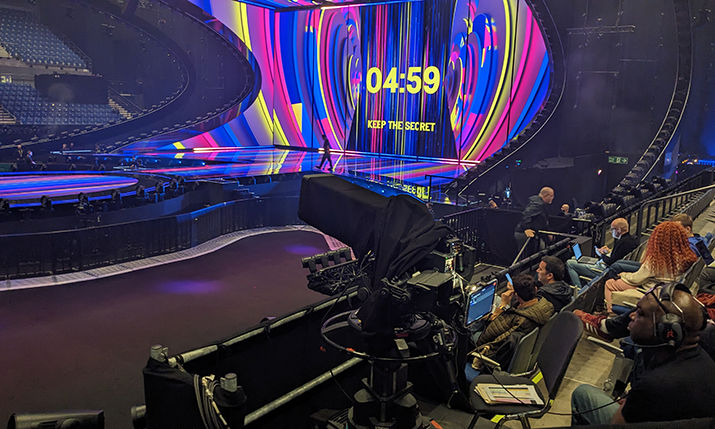
The Eurovision Song Contest is a much anticipated musical event across the world
Flawless delivery
No pressure then to deliver it all flawlessly, a task which in large part rests on his shoulders.
As a provider to the EBU, Eurovision’s technical services has two primary responsibilities for each ESC: production of the voting sequence and the distribution of the content globally.
“It’s quite a feat of technical infrastructure and coordination to make it go smoothly. It is always a little bit nerve wracking to be honest when you are trying to bring up these 37 signals and talk to 37 studios and get them to do what we need”
On the first, Bartlett explains: “We organise the contribution from the studios of all 37 participating countries over our network of satellite, fibre and IP into our MCR in Liverpool (supplied by NEP).
“We coordinate all those signals, we produce them and individually talk to each country to make sure they’re prepared. We then sequentially switch those through to the BBC OB.”
This is the ninth time the BBC has hosted the Contest and the fourth time it’s hosted on behalf of another broadcaster. This year the team at BBC Studios is producing the three live shows from the Liverpool Arena.
A key element of the Contest’s televised formula is the voting. This is a complex formula in its own right and involves the audience in participating countries using the official app (or by telephone and/or SMS) to register their favourites. This year this is extended to viewers watching around the world can from non-participating countries (like the US).
On top of this there are the results of a professional jury appointed by the broadcaster in each of the 37 countries taking part. During the grand final, at the end of the televoting window, the results of each national jury are presented live, one by one, by a spokesperson in each participating country and appear on a scoreboard. During this time, the EBU, its voting partner digame and independent voting observers from E&Y will count and verify the audience results.
For the crucial live jury voting sequence, Eurovision Services ensures that, any one time, the BBC OB is only receiving a main and a back-up signal from Eurovision Services.
“We just handing off the clean signals we receive from the studio. All insertion and graphics is done by the BBC. We are constantly in contact with the BBC and the EBU to make sure that runs as smoothly as possible.”
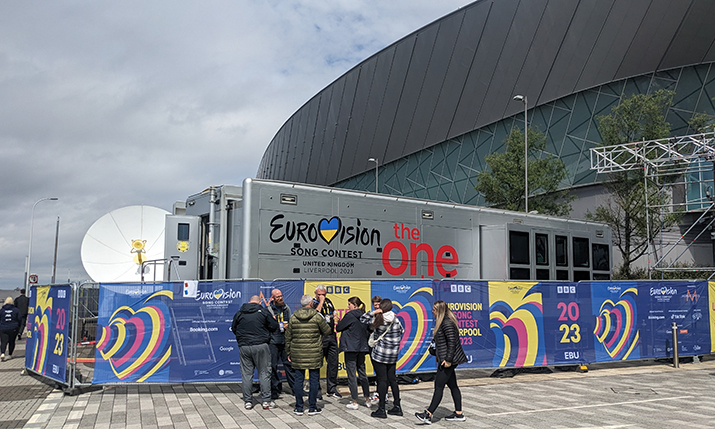
Everything is rehearsed twice for the Eurovision Song Contest. Seen here, the Eurovision OVB compound
Well-oiled machine
This is Bartlett’s first year as project manager in charge of the Eurovision Services team but he has shadowed on previous ESCs. “For me it’s a new challenge but every year we learn how we can improve it. It is a well-oiled machine.
“It is the biggest by audience live music event in the world and no other show attempts live voting on this scale. The real challenge is to ensure we’re using technology that mitigates any threat to signal security”
He continues, “It’s quite a feat of technical infrastructure and coordination to make it go smoothly. It is always a little bit nerve wracking to be honest when you are trying to bring up these 37 signals and talk to 37 studios and get them to do what we need. Technically and from a coordination perspective that’s a real challenge.
“It’s not quite as nail biting as would have been when my colleagues were doing this five to10 years ago. Not that long ago we only used to have a very limited number of satellite channels to bring voting feeds up and down rapidly – and that would often be quite a challenge. Now there are more methods at our disposal.
“But still from my experience shadowing last year it is still quite tense.”
They rehearse twice. Once on the Friday evening and again on the Saturday afternoon (dress rehearsal 2 and dress rehearsal 3) but with fake results.
“We prepare all the country spokespeople and we try to do it exactly as we do it on the live final. We learn every year exactly how we need to tweak things and we communicate well in advance with all 37 countries in terms of the precise sequence of events that will happen on both the dress rehearsals and the night of the live show; That this is what we expect in terms of picture, audio, and communications.”
The second element that Eurovision Services is in charge of is international distribution of the signal from the host broadcaster over its network of satellite and fibre to EBU members and certain non-participating members (US and a few others in Asia).
“It is the biggest by audience live music event in the world and no other show attempts live voting on this scale. The real challenge is to ensure we’re using technology that mitigates any threat to signal security.”
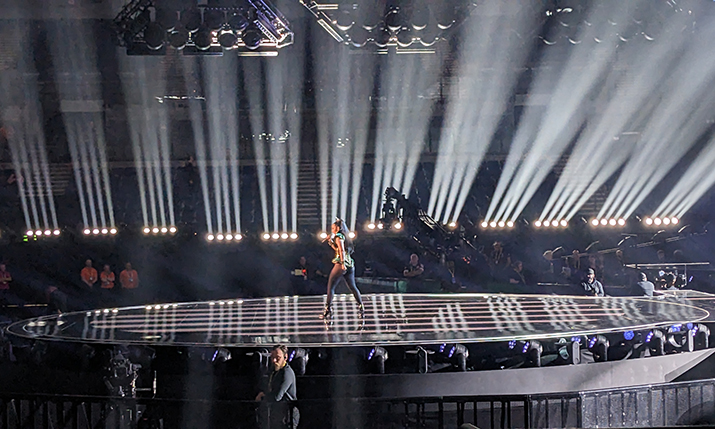
The cyber threat from hackers has increased significantly since Eurovision was hosted in Israel in 2019
Cyber threats
Bartlett says the cyber threat from hackers has increased significantly since the event was hosted in Israel in 2019. This is less an attempt to subvert the vote as a denial of air service attack, which this year includes the added threat of Russian interference.
“The threat is to take us off air. It’s an increasingly bigger topic where we have to try and stay one step ahead and use technology to combat cyber security threats. There will be the more traditional attempts to hack the satellite signals for which we have alternative routes and redundancies in place. When it comes to cyber security that is a bit more of an unknown and an evolving landscape we have to operate in.”
It’s also the first time since 1980 that the previous year’s winner has not hosted the following year’s show. History is always being made at the Eurovision Song Contest and, with the rest of the world also being invited to vote for the very first time, this year’s event promises to be one of the most memorable yet.
There’s a reason why Liverpool’s magnificent waterfront buildings face out to the choppy waters of the Mersey, and not inland. Liverpool is a city built on welcoming the world.
“Liverpool is such an exciting, warm and vibrant city,” said Tim Davie, BBC director general, in a release. “It’s the undisputed capital of pop music.”
From the moment the BBC became host broadcaster for 2023, it began working collaboratively with Ukraine’s public broadcaster UA:PBC.
“No other country has ever hosted on behalf of another country, and with that comes a huge responsibility – to not only make one country proud, but two,” says Andrew Cartmell, executive producer, BBC Studios.
This has included LED screen content designers and music sound production by Ukrainian creatives, whilst the lighting, filming and production teams have all benefited from the experience of professionals from Ukraine.
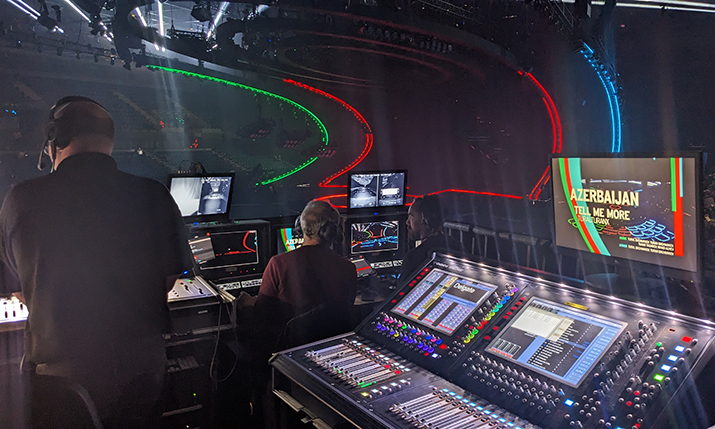
The lighting alone – controlled by Eurovision from this lighting desk – is a major challenge, thanks to the multiple different acts hitting the stage at the Eurovision Song Contest
